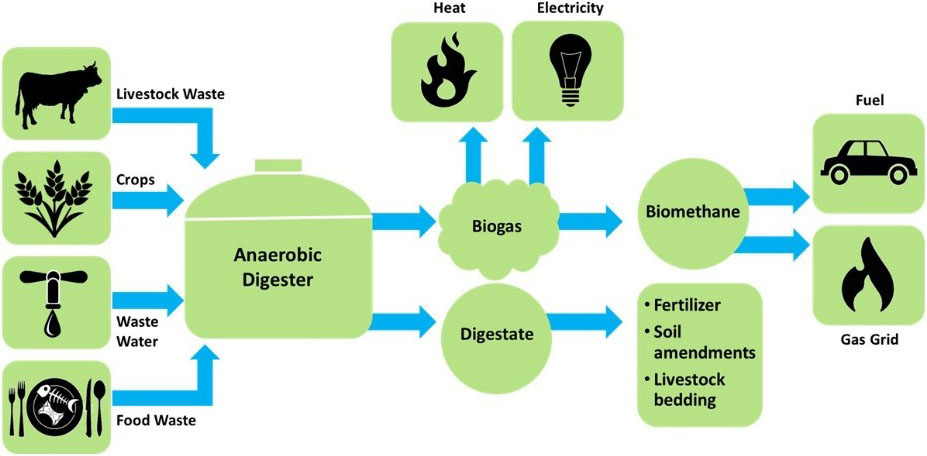Biodiversity & Environment
The Waste-to-Energy Programme
- 07 Nov 2022
- 7 min read
For Prelims: Biogas, BioCNG, Bioenergy, Related Initiatives
For Mains: Biogas Energy and its Significance
Why in News?
Recently, the Central Government has issued guidelines for rolling out its waste-to-energy programme, paving the way for companies to produce biogas and bioCNG, and electricity from urban, industrial and agricultural waste and residues.
What is the Waste-to-Energy Program?
- About:
- The program is part of an umbrella scheme, the National Bioenergy Programme.
- The government will offer financial assistance to project developers, while implementing agencies, including inspection firms, will be paid service charges for commissioning the waste-to-energy plants.
- Implementing Agency:
- Indian Renewable Energy Development Agency (IREDA) will be the implementing agency for the program.
- IREDA will be paid a service charge of 1% of Central Financial Assistance (CFA) to process applications, besides 1% for the CFA (minimum ₹50,000) for implementing, and monitoring the performance once the plants are commissioned.
- Indian Renewable Energy Development Agency (IREDA) will be the implementing agency for the program.
- Financial Assistance:
- The Centre will provide financial assistance of Rs 75 lakh per MW for new biogas plants and Rs 50 lakh per MW for existing units.
- If the waste-to-energy plants are set up in special category states, such as the North East, Himachal Pradesh, Sikkim, Jammu and Kashmir, Ladakh, Lakshadweep, Uttarakhand, and Andaman & Nicobar Islands, the eligible CFA will be 20% higher than the standard CFA pattern.
What is National Bioenergy Programme?
- About:
- The Ministry of New and Renewable Energy (MNRE) has notified the National Bioenergy Programme.
- Sub-Schemes:
- Waste to Energy Programme.
- Biomass Programme:
- Scheme to Support Manufacturing of Briquettes & Pellets and Promotion of Biomass (non-bagasse) based cogeneration in Industries to support setting up of pellets and briquettes for use in power generation and non-bagasse-based power generation projects.
- Biogas Programme:
- To support setting up of family and medium size Biogas in rural areas.
What is Biogas & BioCNG?
- Biogas:
- It mainly comprises hydro-carbon which is combustible and can produce heat and energy when burnt.
- Biogas is produced through a biochemical process in which certain types of bacteria convert the biological wastes into useful bio-gas.
- Since the useful gas originates from a biological process, it has been termed as bio-gas.
- BioCNG:
- Bio-CNG is a renewable fuel obtained by purifying biogas – in contrast to Compressed Natural Gas (CNG), a non-renewable source of energy. Biogas is produced when microbes break down organic matter like food, crop residue, waste water, etc.
- It is similar to natural gas in terms of its composition and properties, and is a cleaner alternative to fuels such as petrol and diesel.
What are the Benefits of Bio Energy?
- Pollution Free Cities:
- The biogas solution can help make our cities clean and pollution-free.
- Leaching of toxic substances from landfills contaminates the groundwater.
- Decomposing organic matter releases huge amounts of methane into the environment, causing air pollution and global warming as methane is a very potent GHG.
- Handling Organic Waste:
- Installing large-scale municipal biogas systems can help cities handle organic waste efficiently to overcome the environmental and socio-economic challenges posed by overburdened landfills.
- Municipal waste can be fed into these plants to create clean and green fuel, along with biofertilizers, while keeping the cities clean and hygienic.
- Helpful for Women:
- Switching to biogas could be good for women because they won't be exposed to harmful smoke and pollution.
- The female members of a household are affected by indoor pollution as they spend more time inside the house.
- Will Transform Energy Dependence:
- Biogas can play a critical role in transforming the energy dependence of rural and agricultural communities, which majorly depends on burning wood, dung, charcoal, coal and other fossil fuels for their energy needs.
- The high dependence on non-renewable sources is the leading cause of the long-standing energy problems in the country.
What are Government’s Initiatives for Promoting Biogas & Waste Management?
- Biogas:
- SATAT Scheme
- The Indian government and Niti Aayog have outlined roadmaps to hasten our transition towards green fuels and promote LNG, hydrogen and methanol.
- Waste Management:
What is IREDA?
- Indian Renewable Energy Development Agency (IREDA) is a mini ratna company under the Ministry of New and Renewable Energy (MNRE).
- It was set up in 1987 as a specialized non-banking finance agency for the renewable energy sector.
- IREDA plays a key role in the renewable energy project financing which gives confidence to the financial institutions/banks to lend in the sector.
UPSC Civil Services Examination, Previous Year Questions (PYQs)
Q. As per the Solid Waste Management Rules, 2016 in India, which one of the following statements is correct? (2019)
(a) Waste generator has to segregate waste into five categories.
(b) The Rules are applicable to notified urban local bodies, notified towns and all industrial townships only.
(c) The Rules provide for exact and elaborate criteria for the identification of sites for landfills and waste processing facilities.
(d) It is mandatory on the part of waste generator that the waste generated in one district cannot be moved to another district.
Ans: (c)





